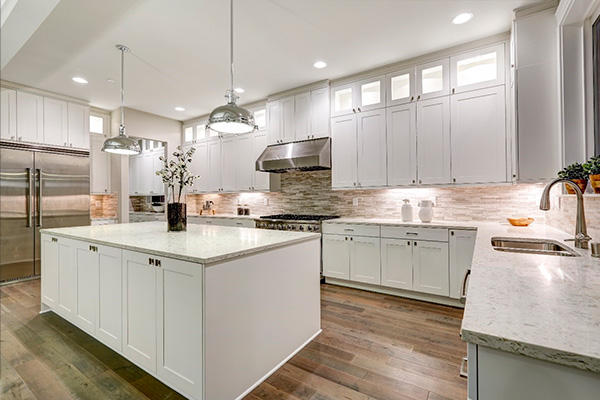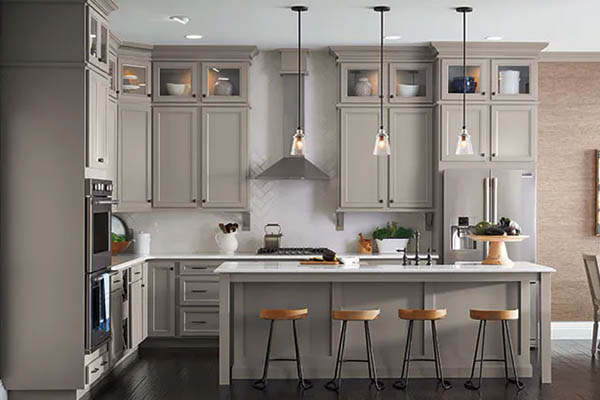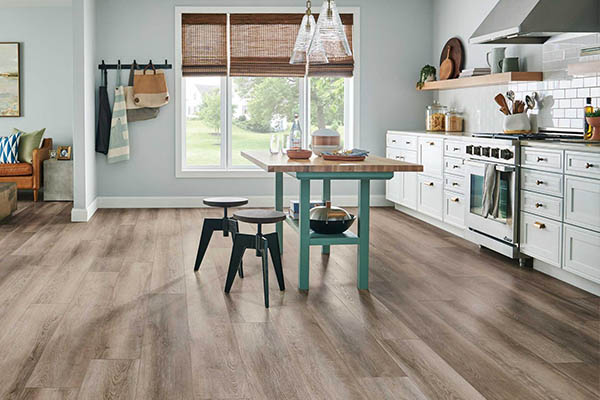Quartz vs. Granite: A Comprehensive Countertop Comparison

Whether you’re building a new home or renovating your existing one, choosing the right materials is essential. After all, they ensure the longevity of your home and have a say in the eventual return on investment.
When it comes to kitchen and/or bathroom renovations, one of the most challenging decisions is choosing between quartz and granite for your countertops. Both materials are solid stone — and incredibly durable. They also come at similar price points. However, several factors, such as the structure and maintenance requirements of each, can make you lean towards one option.
This article is your comprehensive countertop comparison guide for homeowners. We will talk about quartz vs. granite and finally put the debate to an end — or at least for your particular design project. So, let’s get started!
Quartz vs. Granite: What Are They?
Granite is a coarse-grained igneous rock and is 100% natural. It is mined from quarries worldwide, cut down to a manageable size, and later polished. On the other hand, Quartz is a natural stone typically mixed with manufactured materials. For example, your quartz countertops may have 95% ground natural quartz blended with 5% polymer resins. Beyond that, the two materials vary in several ways; please keep reading to learn more.
Quartz vs. Granite: Appearance
Because quartz is an engineered material, it has few limitations regarding colors and designs. It comes in an endless array of hues and patterns, so you can quickly source a piece of quartz that complements any interior. Its manufactured nature also means it is more uniform in appearance.
In contrast, granite is natural, so each stone slab is unique. In fact, you’d struggle to find two granite countertop pieces that are the same. The different veining patterns and inconsistencies are what make granite so majestic.
Granite Close Up

Quartz Close Up

Quartz vs. Granite: Durability
Both granite and quartz are considered very durable. However, granite has a higher resistance to heat. This means you can place a burning hot pan on its surface without harming it. On the other hand, doing so on quartz could scorch it. So, granite gets an edge in terms of kitchen usage.
On the other hand, granite slabs may have inherent flaws. This, coupled with their exposure to hot and cold cycles one after the other, may result in cracks. Comparatively, quartz is less prone to cracking.
Quartz vs. Granite: Composition
The composition is where the real difference kicks in. As we discussed earlier, quartz is an engineered stone made from a blend of natural and synthetic materials, with the former making up 93% to 95% of the total composition. Granite is entirely natural (and is only cut and polished after being sourced from the quarry), meaning it is used without any man-made additions.
Quartz vs. Granite: Cost
Both quartz and granite are considered high-end materials for kitchen countertops and come at a similar price point. You can expect to pay between $50 and $75 per square foot for good-quality quartz countertops, while excellent-quality designer varieties can go up to $150.
On the other hand, granite slabs come in a slightly more comprehensive price range, with good quality options costing between $40 and $100. Custom-made designer options are, again, priced higher.
*The prices quoted do not include installation costs. These are typically between $10 and $30 per square foot.
Quartz vs. Granite: Maintenance
Simply put, you can consider quartz maintenance-free. It resists stains because of its non-porous surface, which repels dirt and moisture. For similar reasons, it harbors less bacteria and keeps the surface germ-free. Additionally, the resins used in fabricating the slabs give it its characteristic hardness, helping the material resist scratching and chipping. As a result, quartz does not require any sealing treatments.
In contrast, granite is relatively porous, which means it may require sealing to avoid stains. This is typically done once at the time of installation and during its lifespan on an ongoing (yearly) basis. Granite sealers are readily available in the marketplace and can be applied in a hassle-free way.
You can use all-purpose cleaners or mild solutions of soap and water to clean your quartz and granite surfaces. You may need to clean granite more often because it is more susceptible to stains and bacteria.
Quartz vs. Granite: Installation
Quartz and granite can be considered equivalent in terms of installation. Both materials are heavy and bulky, so it is recommended to allow professionals to handle them. This is especially important because these natural stones need difficult — and very accurate cuts — which can only be achieved with special tools. Also, if you’re seaming slabs together for your kitchen countertops, creating invisible lines between each piece is a task only professionals can do.
However, if your project is very small and simple (unlike an entire kitchen renovation), you can consider doing it yourself!
Quartz Countertops: Pros and Cons
| Advantages | Disadvantages |
| Versatile appearance: Because quartz is engineered, it is available in every imaginable color and patterns | Low heat resistance: Quartz may scorch under extreme heat |
| Easy maintenance: Quartz countertops don’t require sealing or upkeep |
High cost: Being a natural stone, quartz is considered a high-end option |
| Cleanliness: Quartz is resistant to stains and bacteria |
Installation: Quartz is a heavy material, so it is better to let professionals handle it |
| Durability: Quartz is non-porous, so is less likely to crack or chip |
Appearance: Quartz lacks the natural diversity reflected in granite |

Granite Countertops: Pros and Cons
| Advantages | Disadvantages |
| High heat resistance: Granite is ideal for use in kitchens where hot appliances may often be placed on the countertops |
Prone to cracking: Granite has inherent flaws, which means it may develop cracks |
| Natural appearance: Granite is 100% natural, so is ideal to add a touch of Mother Nature’s artistry to your kitchen |
High cost: Because it is a natural stone, granite is priced high when compared to other countertop material options |
| Maintenance: Granite requires yearly sealing and regular wiping down during its lifetime (which is slightly higher than quartz’s maintenance requirements but still considered an easy job) |
Installation: Like quartz, granite is a heavy material, so is unsuitable for DIY projects |
| Lifespan: Granite can last you for a lifetime if cared for properly |
Harbors bacteria: Because of its porous nature, granite can easily harbor bacteria |

Final Words
When considering quartz vs. granite, finding the most optimal option can be tricky! Your decision is influenced by various different factors — and you have to spend the time to figure out what particular factors you are prioritizing for your design project. For example, if you love complete uniqueness in every slab of stone and don’t mind resealing once a year, granite may be the best choice. If you’re after a no-maintenance option with slightly better durability (at the cost of less unique designs), quartz may be the way to go. Jotting down the requirements of your project and checking them off while choosing your preferred material is the best way to proceed



